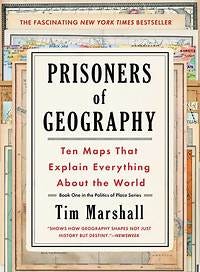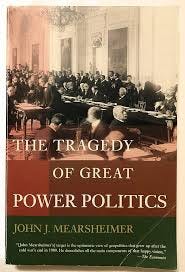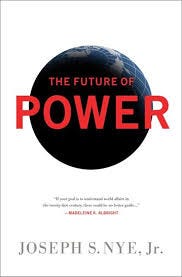A lot of really great books did not make this cut, but I am just looking at ranking based upon proven book sales. This is according to several publishing and retail aggregators. They are not really in ranked order. If you think another book or your favorite was not mentioned, drop me a line and let me know….
The book "Prisoners of Geography: Ten Maps That Tell You Everything You Need to Know About Global Politics" by Tim Marshall explains how physical geography has shaped the political decisions and conflicts of nations. Marshall uses ten maps to illustrate how geographical features like mountains, rivers, and coastlines have influenced historical and contemporary international relations, from Russia's expansive plains to the Middle East's arid landscapes. He delves into how these natural barriers and resources dictate strategic military positions, trade routes, and national policies. For instance, he discusses how the Arctic's melting ice could lead to new geopolitical tensions over resources. This book provides an accessible understanding of how the land itself can be seen as a key player in global politics.
In "The Revenge of Geography: What the Map Tells Us About Coming Conflicts and the Battle Against Fate," Robert D. Kaplan argues that the geographical constants of the world continue to shape human history. Kaplan builds upon the works of past geographers to explore how geography has influenced pivotal moments in history, offering predictions on future conflicts based on these lessons. He examines regions like the Russian steppe, which historically fostered tough and expansionist societies, and the Middle East, where geography has dictated much of its tumultuous recent history. The book posits that understanding geography is crucial for any nation or leader aiming to navigate the complexities of global politics. Kaplan's analysis is a reminder that while human societies evolve, the earth's physical features remain a constant influence on our actions.
"The Accidental Superpower: The Next Generation of American Preeminence and the Coming Global Disorder" by Peter Zeihan explores how America's unique geographical advantages have contributed to its superpower status. Zeihan argues that factors like secure borders, access to abundant resources, and navigable rivers have historically made the U.S. less vulnerable to external threats and more capable of internal growth. The book forecasts a future where globalization might wane due to demographic changes, resource scarcity, and shifting geopolitical landscapes, potentially leading to global disorder. Zeihan also discusses how America might navigate these changes to maintain or even enhance its influence. This analysis serves as both a history lesson and a strategic guide for understanding America's role in the world.
"World Order" by Henry Kissinger delves into the historical evolution of world orders, from European power politics to the current American-led system. Kissinger traces the journey of international relations through various cultures and empires, examining how different civilizations have conceptualized and implemented order. He critiques the contemporary global system, highlighting the challenges in maintaining peace and stability in a world where traditional nation-states face new actors like non-state entities and digital networks. The book offers insights into how past solutions to international order might inform current and future policy-making. Kissinger's analysis is both a historical review and a call to consider the philosophical underpinnings of global governance.
"The Grand Chessboard: American Primacy and Its Geostrategic Imperatives" by Zbigniew Brzezinski focuses on America's role in shaping the geopolitical landscape post-Cold War. Brzezinski uses the metaphor of a chessboard to describe the strategic importance of Eurasia, where he sees the key to maintaining American global dominance. He outlines how the U.S. should manage its relationships and conflicts in Europe, Central Asia, and East Asia to prevent the rise of a rival superpower. The book discusses the importance of alliances, the use of soft power, and the strategic manipulation of geopolitical spaces. Brzezinski's work offers a strategic framework for U.S. foreign policy, emphasizing the need for a nuanced understanding of global chess moves.
"The Post-American World" by Fareed Zakaria examines the shift in global power dynamics, with the rise of countries like China, India, and Brazil challenging American hegemony. Zakaria provides a historical context to show how previous unipolar moments have ended, suggesting that the world is entering a phase where power is more evenly distributed. He explores how the U.S. can adapt to this new reality by focusing on innovation, education, and embracing multiculturalism. The book also discusses the implications of this shift for international institutions and global governance. Zakaria's insightful analysis suggests a future where America must redefine its role in a world of multiple power centers.
"Destined for War: Can America and China Escape Thucydides's Trap?" by Graham Allison investigates the historical pattern where the rise of a new power leads to conflict with an established one. Allison uses Thucydides's Trap to frame the current U.S.-China dynamic, analyzing past instances where such power transitions led to war. The book explores both the inevitability of conflict and potential pathways to avoid it, through diplomacy, strategic foresight, and mutual understanding. Allison argues for a strategic rethinking of U.S. policy to manage this relationship without leading to catastrophic confrontation. His work is both a warning and a call for innovative approaches to international relations.
"The Tragedy of Great Power Politics" by John J. Mearsheimer introduces the theory of offensive realism to explain how great powers behave in the international system. Mearsheimer posits that states, particularly great powers, aim for hegemony within their region due to the anarchic nature of international politics, where security is never assured. He uses historical case studies to illustrate how this pursuit of power leads to conflicts, focusing on the balance of power, especially between the U.S. and China. The book challenges the idea that liberal policies can fundamentally alter the competitive nature of international relations. Mearsheimer's analysis is pivotal for understanding the underlying motivations behind state actions in the geopolitical arena.
In "On China," Henry Kissinger offers an in-depth look at China's history, culture, and its approach to diplomacy and international relations. Drawing from his personal experiences in dealing with Chinese leaders, Kissinger explores how China's centuries-old view of the world influences its modern policies. The book contrasts Western and Chinese strategic thinking, particularly in terms of negotiation, patience, and long-term planning. Kissinger discusses pivotal moments in Sino-American relations, providing insights into how these interactions might shape future global politics. This work is essential for understanding the nuances of China's role in the international community.
"The Future of Power" by Joseph S. Nye Jr. examines how power dynamics are changing in the digital age, affecting geopolitics. Nye introduces the concept of 'smart power,' which combines hard (military, economic) and soft (cultural, ideological) power for more effective international influence. He argues that while traditional forms of power are still relevant, the rise of information technology has democratized power, allowing non-state actors to influence global events. The book discusses how countries can leverage these new power dynamics to achieve their foreign policy objectives. Nye's analysis is crucial for understanding how power will be wielded in an increasingly interconnected world.













